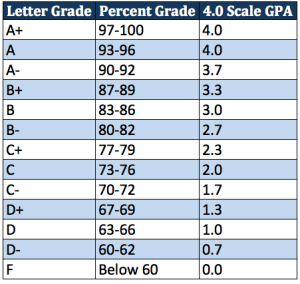
This is a guest post by Euan Swan.
The summer is winding down and transitioning to a new year at college. With a new beginning, comes many new experiences and challenges ahead.
If you are entering college as a freshman this fall, good luck, have fun, and remember – take it easy. Speaking as a junior in college, the last thing you want to do is stress yourself out as soon as you arrive. A good way to transition is to introduce yourself to your neighbors; you’ll be seeing them a lot this coming year.
When engaging in small talk, you will more than likely get asked, “What’s your major?” It seems this is one of everyone’s first questions. While it can be a good conversation starter, it usually gets old fast.
However, discussing your major over and over again helps you reflect if it’s actually right for you. Let me share a story to expand upon what I mean.
My Personal Journey Through Majors
Going into college, I thought I had to have everything together. I thought I had to have my major decided, know which minors I wanted to complete, as well as get involved as much as I could. I quickly realized this mentality stressed me out.
If you to go to university in the U.K. (where I was born), you have to decide your major (even though it isn’t called that over there) you want to pursue, right away. Changing your field of study half way through your program, or even after one semester, is often seen as a sign of inconsistency and looked down upon. Therefore, people who study in the U.K. rarely change their major, if ever.
Now that I attend college at Indiana University in the U.S., I have begun to realize that changing your major multiple times is commonplace.
I was one of these people, and worried if I really wanted to study my first major, marketing.
I took a couple of prerequisite courses for the marketing program before deciding to change my major to finance. I changed it to finance because I started to think what my income would look like after I graduate, and I realized that a career in finance would pay more.
After taking two finance courses, I quickly realized the subject definitely wasn’t my strong suit. Sure if I practiced it, I could get better, and possibly graduate with a finance degree and land a high-paying job. But, I would hate myself. I would be doing something that I didn’t enjoy.
That’s why I decided to change my major back to marketing. I knew that I enjoyed marketing, but wasn’t sure how far a marketing degree could take me. I stayed in the marketing program for some time, but once again I needed a change.
So, I chose to pursue and am currently a management major. I do enjoy marketing, but I felt management suited me better. I have always been the guy to desire a handle on everything, and a management major gives me that satisfaction. I also decided to pursue an entrepreneurship and small business minor, due to my entrepreneurial mindset.
After staying with my major and minor for the past semester, I can now say with certainty that I am set in my decision. Especially after interning for a Fortune 500 company this past summer, I learned that your degree is sometimes just an admission ticket through the door.
Think Of It This Way
Say for example that you graduate from college with a degree in economics. You graduate with a 3.8 GPA. After a year, you can’t find a job where you can implement what you learned in studying economics. You realize that you are really good with people though, so you decide to apply for a human resources position at Company X.
You receive an interview request from Company X and you decide to go for it. Company X enjoys your warm personality and feels you would be a beneficial asset to the company. They decide to take you on.
After your first two weeks of learning the ropes, you are handed your first big project. This project has nothing to do with economics, but instead, will require a lot of interpersonal communication. You can’t use what you’ve learned from your college studies in this project, but what you can use is your work ethic.
In hiring you, Company X saw that you had a high work ethic, due to your high GPA. They also felt that you had a friendly personality. Even though you had an economics degree, Company X knew that you could excel in a human resources position.
That leads me back to my point. Sometimes your degree doesn’t necessarily matter to an employer, as it is just an admission ticket through the door. What matters is whether or not you have a drive to succeed, and at the end of the day, deliver results. Although this kind of hiring mentality may apply to most companies, there are still those firms who adopt a more “knowledge-centric” approach.
For example, if you’re a finance major trying to get a job at PWC or Deloitte, then you will have to have a high work ethic, followed by an impressive resume with a strong educational background. At most other companies though, your degree doesn’t hold as much weight.
Companies want results, and if you can deliver those results, regardless of your college major, then you will find a job, end of story.
You shouldn’t worry about whether or not you chose the right major your first time around. I certainly didn’t! If you’re feeling unsure about your major, you might find it helpful to read some tips on how to Choose a College Major.
Choose a major to see if you like it, and if you don’t, you still have time to change it to something else.
That’s something that I like about the American education system. There is so much flexibility in changing your field of study. If you end up not enjoying your major, you have the opportunity to change it. If you do not like it again, you can change it once again.
Keep in mind that your major is not everything these days though. In today’s economy, there are hundreds of thousands of graduates coming out of universities every year. That means the job market for college graduates is saturated. So, a college degree doesn’t guarantee career success.
Back when the figure of graduates was a lot smaller, a degree meant a lot more. That’s why I mentioned earlier that your particular degree doesn’t matter as much as the results that you can deliver.
Choose a major you think you will enjoy in college, but also one that will drive you to work hard.
Make sure that you can leverage the knowledge that you will gain from that major in the real world though.
So, relax, enjoy, and experience all that the college life has to offer you. Let your interests carry your decision on what your final major choice will be, and understand that your final decision doesn’t lock you into a specific job after you graduate.
And you can always go back to school at a place like Excelsia College Online for a postgraduate degree. Don’t sweat this decision too much!


